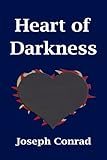
Heart of Darkness by Joseph Conrad (1899). 117 pages, Easton Press.
I have never read anything by Joseph Conrad before picking up this book a week ago. I've had it on my shelf for a few months, as part of the Easton Press "100 Greatest Books Ever Written" collection that I subscribe to (one book a month, you know). Anyway, about a week ago I was scanning my shelves for a DVD to watch, and paused over Apocalypse Now. I decided on something else that night, but I was reminded that I had never read the novel that was the source material for Apocalypse Now – Heart of Darkness.
So, later that night, I pulled the book down and started reading it. Having seen Apocalypse Now probably six or seven times (the first time when it originally came out in 1979, in a theater in Elizabethtown, Kentucky), I'm pretty familiar with the movie. I assumed, having heard that Heart of Darkness was the source for the film, that it would share some loose plot elements, but otherwise bear little resemblance.
My conclusion after finishing the book is quite the opposite. Apocalypse Now is Heart of Darkness – just updated for the 1970's and with a change of local from Africa to Viet Nam. The character names are the same. Much of the actual dialogue is the same. The situations and moral tone is the same. The ending is (almost) the same. I discovered that I knew the entire plot of the book, from beginning to end, because of my familiarity with Apocalypse Now.
Heart of Darkness follows the journey of a professional Merchant Marine, Marlow, as he navigates up the Congo river in the late 1800's. Marlow has been hired to repair and pilot a steamboat up the river and retrieve Mr. Kurtz – an "agent of the company" who was supposed to collect ivory from the natives and ship it back for sale. However, oddly enough, Mr. Kurtz refuses to return from his post, and strange tales come down the river about what has been going on in Mr. Kurtz's village. Eventually, Marlow finds Kurtz, and what he discovers in that village deep in the jungle, horrifies him and changes his life forever.
A short novel (really a novella), the book is divided into three untitled chapters. Chapter One describes how Marlow got the job through the connections of an Aunt, his journey from Belgium to the Congo, and his travel inland to the outpost on the river where his steamboat command is supposed to launch from. Chapter Two covers Marlow's repairs of the wrecked steamboat he finds at the outpost, his discovery of what is known so far about Mr. Kurtz, and the launch of the steamboat upriver – until the boat falls under attack.
The final Chapter Three covers Marlow's meeting with Kurtz and his disciples, the resolution of both of their stories, and Marlow's eventual return to civilization – and his decision on what to do with the legacy that Mr. Kurtz has bequeathed to him.
It's a good story, and it's not hard to see how and why it inspired Apocalypse Now. But what is downright astonishing is the prose itself. Like I said, I've never read anything written by Conrad before, and there are passages in this book that literally took my breath way, they are so well written. This is a very rich book, rich in detail, rich in language. I read each chapter twice before proceeding to the next, because there is so much to take in that I felt I was missing something. I didn't want to move further along in the story until I had absorbed everything completely. And after finishing the book (it is a short read) I went back again and skimmed through the whole, re-reading select passages now that I knew the whole story.
The prose tone reminds me somewhat of Herman Melville's in Moby Dick (the only Melville work I've read), but streamlined and more modern. I felt that Melville, writing in 1850, was deliberately attempting to make his novel sound like it was written A Long Time Ago – exemplified by his use of "Thee" and "Thy", which by 1850 had been out of use for quite a while. Conrad, on the other hand, writing just as the 19th century was turning into the 20th, sounds completely current to these modern ears. What I'm trying to say is that Conrad sounds like a modern writer. His rich and dense prose needs no analysis or annotation for the modern reader to understand it clearly.
I guess what I'm trying to say is that while the tone reminds me of Melville, that actual writing style is a lot more like Ernest Hemingway or F. Scott Fitzgerald.
This may be influenced by the fact that Conrad, originally from Poland, learned English as his second language - he didn't speak a word of English until he was 21 years old. Perhaps, learning English as an adult in the late 19th century, aboard various ships populated by crews of young men from all over the English-speaking world, he learned a newer, more modern form of English. Or perhaps he's just a fantastic writer and no other explanation is required or expected.
Whatever. Although this was the first time I've read a book by Conrad, it will definitely not be the last. I'm already starting Lord Jim.
So, if you've seen Apocalypse Now and have always been curious... or if you just like a solid, well-written novel that will haunt you for days afterwards... well, then, read Heart of Darkness. To paraphrase the Russian youth from Chapter Three, it will enlarge your mind.